Amid mask fight, some returning lawmakers asked to take COVID tests before session starts
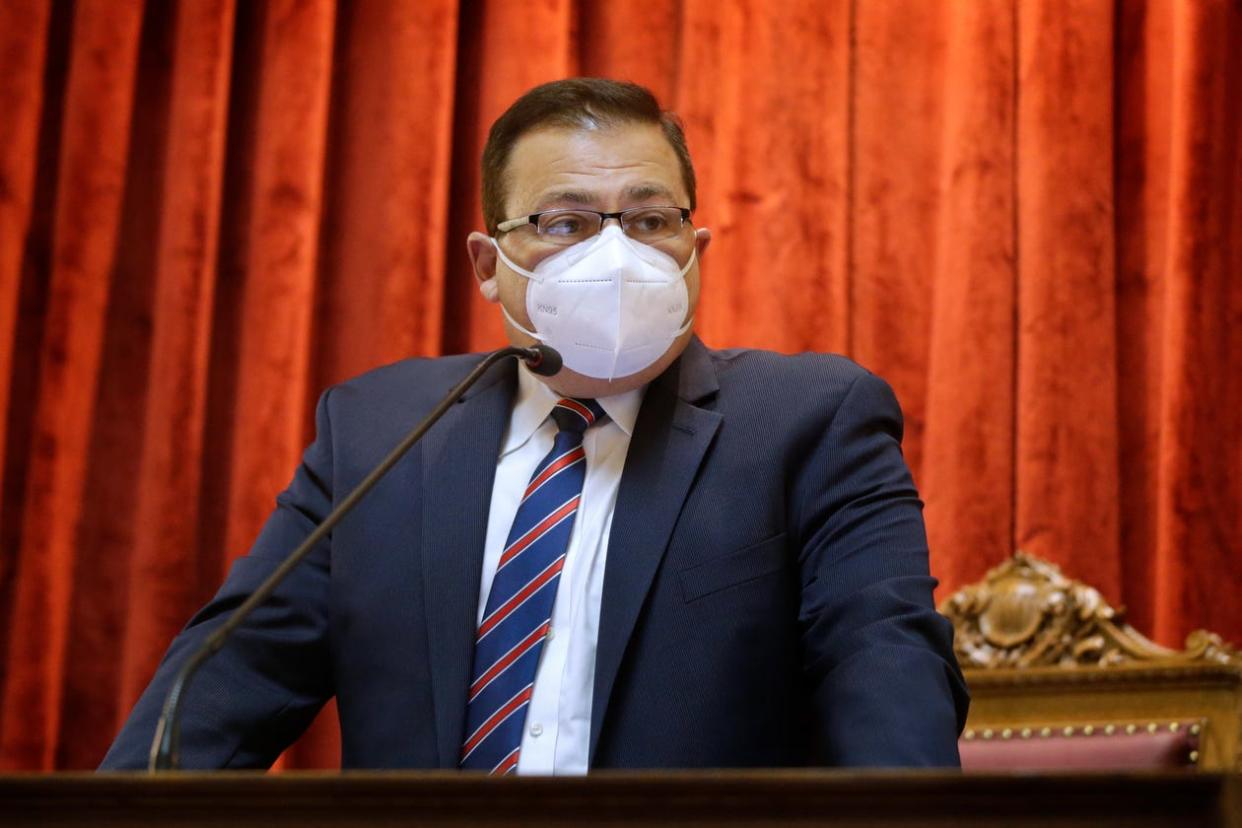
- Oops!Something went wrong.Please try again later.
- Oops!Something went wrong.Please try again later.
PROVIDENCE — On their first day back from a six-month break, Rhode Island lawmakers approved — and Gov. Dan McKee signed into law — $119 million in federal windfall spending, including a flurry of election-year "bonuses" for select groups of workers.
They confirmed a passel of new judges and also overrode two of McKee's vetoes, including one of a bill guaranteeing the payment of auto-body shop markups pushed by a persistent State House lobby that parceled out more than $99,000 in political donations last year.
In the Senate, the returning lawmakers found rapid COVID-19 test kits on their office desks, which they were asked to take before coming to the Senate floor, with no reported positives.
The House opted not to do so.
More about 'auto body shop' bill: Will lawmakers override McKee's 'auto body shop' veto? What will it mean for insurance premiums?
House Speaker K. Joseph Shekarchi explained in an opening-day email to colleagues: "Like many of you, I have been disheartened by the reports that our constituents are forced to wait in long lines at state-run COVID testing sites, and I share their frustration that they are waiting far too long to receive test results.
"I don’t think it is prudent at this time to be distributing test kits to our members at the State House."
The most contentious issue of the day: masks.
Political Scene: RI legislature reopens Tuesday with votes on spending, veto overrides
The Democrats, who hold a 98-to-15 majority in the two chambers, wore masks, as they have through months of off-session committee hearings. The leader of the tiny House GOP caucus protested the requirement in advance.
Anticipating the issue, Shekarchi sent out an email on Dec. 20 that offered "those who do not comply with the mask mandate ... seating in the House gallery," with accommodations to allow them to speak during debate and voting.
With a newborn in intensive care,RI Senator tries and fails to get OK to vote by proxy
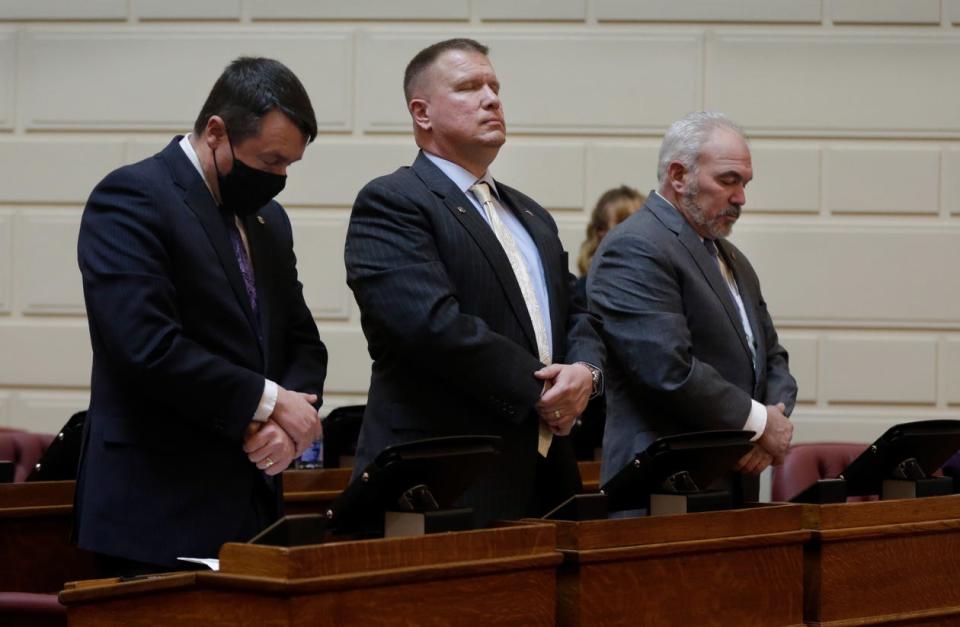
But House GOP Leader Blake Filippi of Block Island wrote back, "The Minority Caucus has determined that maskless House members may not be involuntarily relegated to the House gallery.
"They have a right to conduct legislative business on the House floor. No rule of the House can de facto usurp this right."
Instead of relegating maskless Republicans to the galleries, Filippi suggested any Democrat who is uncomfortable go to the House gallery, which "would be safer for them: away from the bulk of members, regardless of masks. "
In the end, however, only three of the eight House Republicans present went maskless. Even Filippi wore a mask.
When asked why, he said: "I am being polite and we are in close quarters ... and I am choosing to wear this mask out of my own volition. I am not wearing it because of any unlawful executive orders or any dictates from the speaker.
"This is my personal choice," he said.
But a handful of lawmakers seated near unmasked Republicans Justin Price, David Place and Robert Quattrocchi moved into empty seats elsewhere.
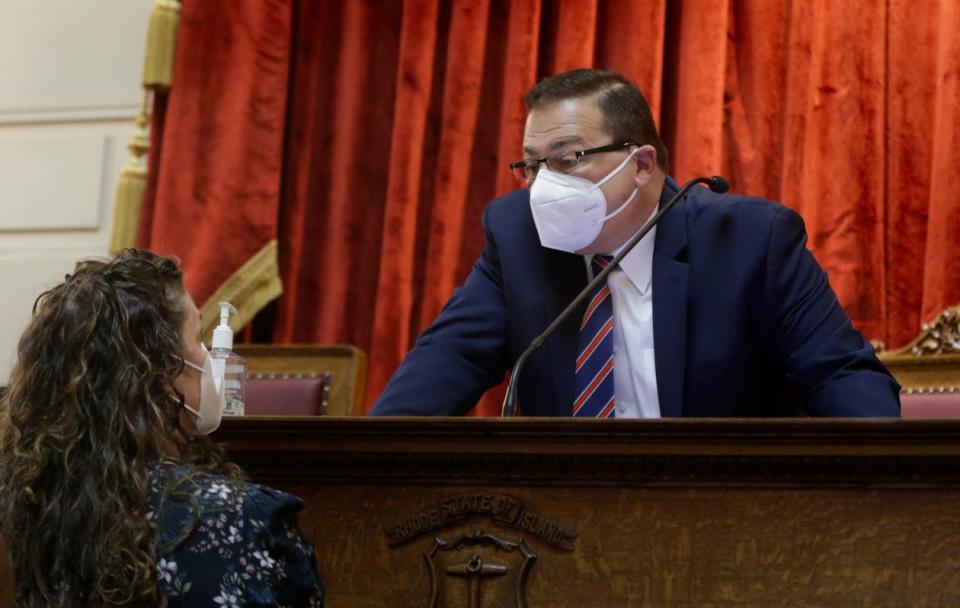
Rep. Teresa Tanzi, D- South Kingstown, was among them. "In a public health emergency, with rising [COVID] rates'' and surging hospitalizations, "I think it is in everyone's best interest, regardless of their political ideology, to comply," she said.
"And frankly, I am disgusted that my seatmates in the Republican Party care so little about our hospital workers ... [and] their co-workers," she said.
And so the 2022 legislative session began with a significant number of lawmakers absent — 10 in the 75-member House, 7 in the 38-member Senate — including several believed to be out with COVID.
In his welcome back speech, Speaker Shekarchi lauded the opening day approval of "the first down-payment on $1.1 billion dollars in federal funds that will boost our economy and assist families and businesses."
Looking ahead to the next six months, Shekachi said: "A good deal of our work - as was the case last year - will focus on the health and economic issues related to the pandemic, which still has us in its grip."
"We are presented with an historic opportunity to make critical long-term investments to ensure our state is in a better place for everyone. Including businesses, workers, families, children and seniors — for decades to come," he said.
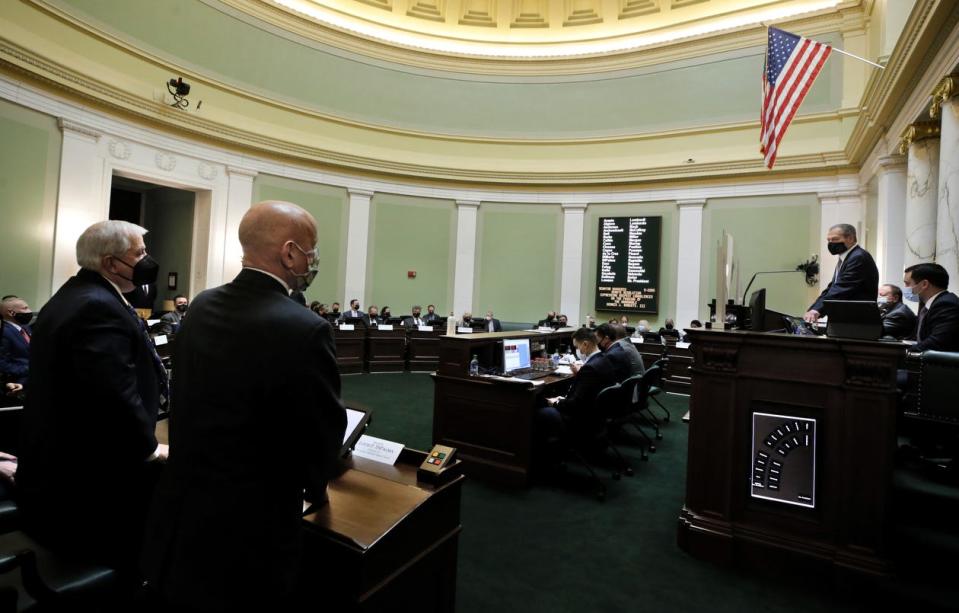
In his own opening day speech, Senate President Dominick Ruggerio predicted the legalization of recreational use of marijuana this year.
He also promised: "We will put Rhode Island on a path to achieve universal pre-k within five years...Reinvest in the “Care Economy,” including through tuition forgiveness for those who enter fields such as nursing and teaching...Consider a comprehensive package of climate jobs legislation...replacing lead pipes, repairing deficient dams, and protecting against sea level rise...[and continue to invest in] affordable child care and affordable housing."
Federal money
The spending bill McKee signed into law earmarks the first 10% of Rhode Island's $1.13 billion in federal American Rescue Plan dollars to a plateful of broadly described efforts, from "affordable housing" to "small business relief."
In September, McKee proposed spending $113 million of the state's federal windfall on, among other things, $2,000 retention bonuses for childcare workers and $45 million in assistance for small businesses.
Lawmakers kept most of McKee's proposal and added $6 million to the childcare-worker program, bringing the total price tag to $119 million and boosting the maximum bonus from $2,000 to $3,000 per worker, per year.
But with most states having spent at least some of their federal aid months ago, some senators argued that the $119 million burst of spending now is too little, too late.
Sen. Cynthia Mendes, an East Providence Democrat who is running for lieutenant governor, asked: "Who among us can say that this is enough and on time to our constituents, to public school teachers right now, to our essential workers who never got hazard pay, to service providers plugging in the gaps?"
The spending package also includes $12.5 million for $700-per-month retention bonuses for Department of Children, Youth and Family direct-care workers.
Sen. Jonathan Acosta, D-Central Falls, argued that the childcare worker bonuses — which will be paid out in twice-a-year installments, also should have been monthly.
"What is going to happen is the people who need money now won't get it and we won't stave off the workforce hemorrhaging in childcare and other sectors of the economy," Acosta said.
Acosta and Mendes ultimately voted for the spending bill, which passed the Senate and the House unanimously.
There's a deal: Here's what we know about the plan to begin spending COVID relief in RI
The small business aid includes $32 million in aid to businesses with less than $1 million in revenue hurt by the COVID-19 pandemic.
Other pieces of the spending plan include $15 million for affordable housing developers, and $13 million for the hospitality industry.
Judicial appointments
The Assembly confirmed five of McKee's appointment to lifetime judgeships and approved two new magistrates.
The judges are Kevin McHugh in Superior Court; Jeanine Perella McConaghy and Shilpa Naik in Family Court; William J. Trezvant in District Court and George J. Lazieh in Workers' Compensation Court.
The magistrates are Gina K. Lopes and William P. Rampone.
Veto overrides
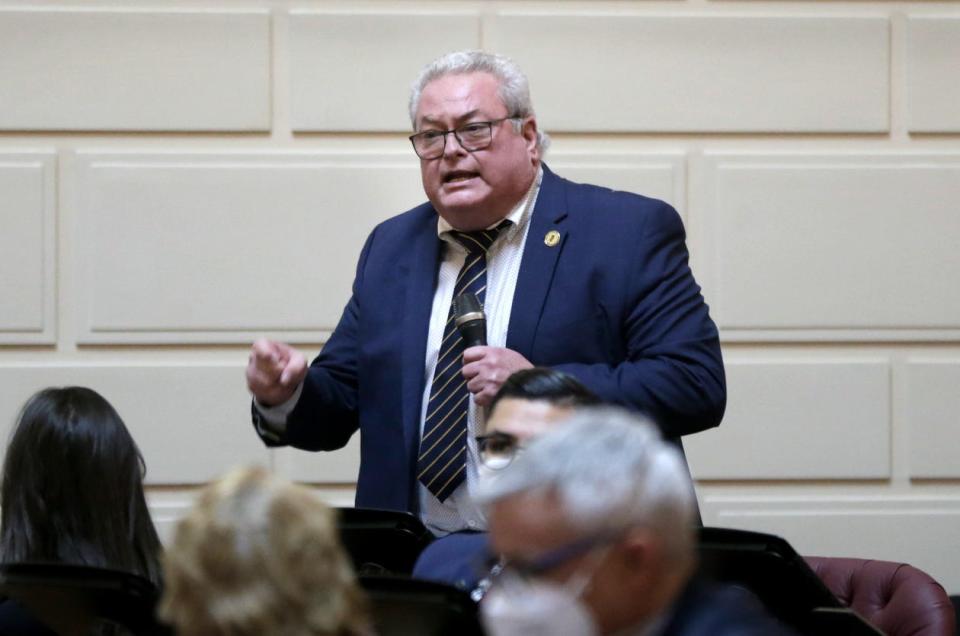
The lawmakers overrode two of the governor's summer vetoes, including one obliging the state's auto insurers to pay auto-body shop markups and a less controversial measure creating a registry for Airbnb, Vrbo and other short-term rentals bedeviling communities like Newport.
Of the auto-body shop bill, McKee's veto message said: "The National Association of Insurance Commissioners ... ranks [Rhode Island] 7th in the nation for highest auto insurance premiums. As we look to restart our economy after the pandemic, we cannot implement measures that may drive costs even higher for consumers and small businesses."
The brother of one of Shekarchi's former clients — Johnston body shop owner and developer Thomas Casale — led a campaign for the override that included the submission of an op-ed to The Journal.
The op-ed said, in part: "The governor was mistaken ... The act does not add any new costs at all. Payment of industry standard markup and sublet services have always been honored by most insurance companies.
"However, a small number of mostly out-of-state insurers take their customer’s premium payments, but after an accident, they want to get away without paying for what is necessary to repair the vehicle."
The auto body shop owners also handed out at least $99,050 in political donations between Jan. 1 and Sept. 30, 2021. The vast majority of those dollars went to state lawmakers.
This article originally appeared on The Providence Journal: RI lawmakers return for '22 session, consider federal windfall, vetoes

